
- Afhalen na 1 uur in een winkel met voorraad
- Gratis thuislevering in België vanaf € 30
- Ruim aanbod met 7 miljoen producten
- Afhalen na 1 uur in een winkel met voorraad
- Gratis thuislevering in België vanaf € 30
- Ruim aanbod met 7 miljoen producten
Zoeken
Politics and the New Challenge of Migration
Bridging Cultural, Social and Political Divides
Gordon Sammut
€ 136,95
+ 273 punten
Uitvoering
Omschrijving
This volume provides a comprehensive overview of the social psychology of conflict rooted in human evolution, with a particular focus on migration and its challenges in a globalized world. It examines theories for how conflict emerges between cultural, social, and political groups striving to advance their own interests and agendas and considers their impact on democratic systems that guarantee human rights and freedoms. Building on the study of social psychological tendencies and motivations, including human needs for identity and affiliation, new empirical procedures are introduced for bridging cultural, social, and political divides that encourage students, scholars, and policymakers to consider reconciliatory strategies for conflict resolution. By examining political leanings and tendencies for activism and democratic engagement, this book articulates the ethical and political moral grounds guiding decision-making in intergroup and intercultural relations and challenges readers to reflect on their moral standpoints.
Specificaties
Betrokkenen
- Auteur(s):
- Uitgeverij:
Inhoud
- Aantal bladzijden:
- 207
- Taal:
- Engels
- Reeks:
Eigenschappen
- Productcode (EAN):
- 9781009285087
- Verschijningsdatum:
- 9/10/2025
- Uitvoering:
- Hardcover
- Formaat:
- Genaaid
- Afmetingen:
- 152 mm x 229 mm
- Gewicht:
- 453 g

Alleen bij Standaard Boekhandel
+ 273 punten op je klantenkaart van Standaard Boekhandel
Beoordelingen
We publiceren alleen reviews die voldoen aan de voorwaarden voor reviews. Bekijk onze voorwaarden voor reviews.








